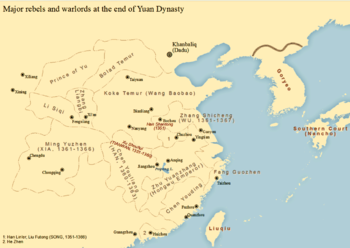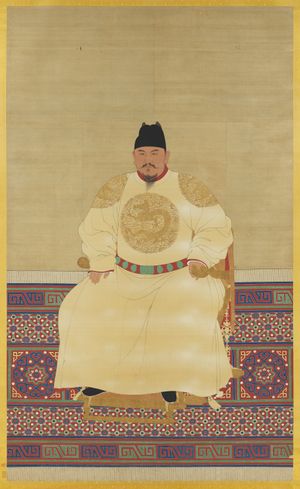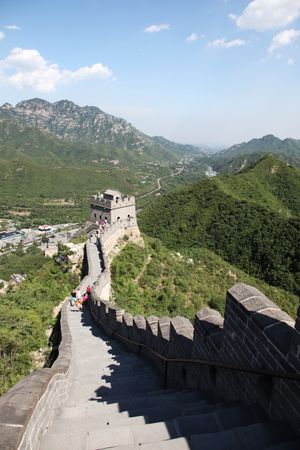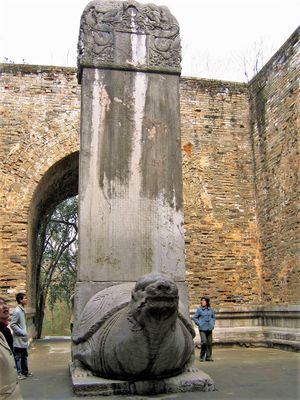هونگوو الامبراطور
| هونگوو الامبراطور 洪武帝 Hongwu Emperor | |||||||||||||||||
|---|---|---|---|---|---|---|---|---|---|---|---|---|---|---|---|---|---|
 پورتريه لهونگوو الامبراطور معروض في متحف القصر الوطني. | |||||||||||||||||
| أول أباطرة أسرة مينگ | |||||||||||||||||
| العهد | 23 يناير 1368[n 1] – 24 June 1398 | ||||||||||||||||
| التتويج | 23 يناير 1368 | ||||||||||||||||
| تبعه | جيانوِن الامبراطور | ||||||||||||||||
| امبراطور الصين | |||||||||||||||||
| العهد | 1368–1398 | ||||||||||||||||
| سبقه | أوخاتو خان (أسرة يوان) | ||||||||||||||||
| تبعه | جيانوِن الامبراطور (أسرة مينگ) | ||||||||||||||||
| وُلِد | 朱重八 21 أكتوبر 1328 هاوژوو، مقاطعة هـِنان جيانگبي، أسرة يوان، (فنگيانگ، آنهوي حالياً)[1][2][3] | ||||||||||||||||
| توفي | 24 يونيو 1398 (aged 69) جينگشي، أسرة مينگ (نانجينگ، جيانگسو حالياً) | ||||||||||||||||
| الدفن | 30 يونيو 1398 | ||||||||||||||||
| زوجاته | |||||||||||||||||
| الأنجال تفاصيل | ژو بياو يونگلى الامبراطور | ||||||||||||||||
| |||||||||||||||||
| البيت | بيت ژو | ||||||||||||||||
| الأب | ژو شيژن | ||||||||||||||||
| الأم | الليدي چـِن | ||||||||||||||||
| الديانة | البوذية | ||||||||||||||||
| هونگوو الامبراطور | |||||||||||||||||||||
|---|---|---|---|---|---|---|---|---|---|---|---|---|---|---|---|---|---|---|---|---|---|
| الصينية | 洪武帝 | ||||||||||||||||||||
| المعنى الحرفي | vastly martial emperor | ||||||||||||||||||||
| |||||||||||||||||||||
- هذا هو اسم صيني; لقب العائلة هو ژو.
هونگوو الامبراطور (21 أكتوبر 1328 – 24 يونيو 1398)، الاسم الشخصي ژو يوانژانگ (صينية: 朱元璋؛ ويد–جايلز: Chu Yuan-chang�)، هو الامبراطور المؤسس لأسرة مينگ، حكم من عام 1368 حتى 1398.
في منتصف القرن الرابع عشر، اجتياح المجاعة، والأوبئة، وثورات الفلاحين أرجاء الصين، ارتقى ژو يوانژانگ لقيادة القوات التي غزت الصين وأنهت حكم أسرة يوان المنغولية، وأجبرتهم على التراجع إلى السهول الأوراسية. ادعى ژو أنه مفوض من السماء وأسس أسرة مينگ في مطلع عام 1368؛ وفي العام نفسه احتل جيشه عاصمة أسرة يوان، خانباليق (بكين حالياً). لم يكن الامبراطور يضع ثقته سوى في عائلته، فعجل من أبناؤه أمراء إقطاعيين أقوياء على امتداد المقاطعات الشمالية ووادي يانگتسى.[4] Having outlived ابنه الأكبر ژو بياو، نصب هونگوو ابن ژو بياو من خلال سلسلة من الإرشادات، الأمر الذي انتهى بالفشل، عندما حاول جيانوِن الامبراطور خلع أعماه مما أدى لقيام تمرد جينگنان.[5]
اشتهر عهد هونگوو بإصلاحاته السياسية الغير مسبوقة.ألقى منصب المستشار، وحد بشكل كبير من دور خصيان البلاط، وقمع الفساد بتدابير صارمة. أسس أيضاً حرس الزي الموحد المطرز، واحداً من أفضل تنظيمات الشرطة السرية المعروفة في الصين الامبراطورية. في عقد 1380 و1390 أُطلقت سلسلة من عمليات التطهير للقضاء على جنرالاته وموظفيه رفيعي المستوى، التي أُعدم فيها عشرات الآلاف منهم.[6]
شجع الامبراطور الزراعة، خفض الضرائب، وحفز على زراعة الأراضي الجديدة وسن القوانين التي تحمي ممتلكات الفلاحين. كما صادر الأراضي الضخمة المحتكرة من قبل الملاك وأنهى العبودية الخاصة. وفي الوقت نفسه حظر حرية الحركة في الامبراطورية وخصص فئات مهنية وراثية للأسر.[7] من خلال هذه التدابير، حاول ژو يوانژانگ إعادة بناء البلاد التي دمرتها الحرب، الحد من سيطرة الجماعات الاجتماعية، الانتقال بالشعب للقيم التقليدية، [8]وفي نهاية المطاف خلق مجتمع متماسك من المجتمعات الزراعية المكتفية ذاتياً.[9]
. . . . . . . . . . . . . . . . . . . . . . . . . . . . . . . . . . . . . . . . . . . . . . . . . . . . . . . . . . . . . . . . . . . . . . . . . . . . . . . . . . . . . . . . . . . . . . . . . . . . . . . . . . . . . . . . . . . . . . . . . . . . . . . . . . . . . . . . . . . . . . . . . . . . . . . . . . . . . . . . . . . . . . . .
السنوات المبكرة
ارتقاؤه العرش
عهده
استصلاح الأراضي
سياسته الاجتماعية
العسكرية
النبالة
الإصلاحات البيروقراطية وترسيخ السلطة
الإصلاح القضائي
الإصلاح الاقتصادي
سياسة التعليم
السياسة الدينية
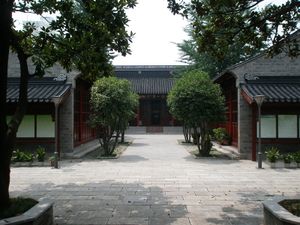
تزعم المصادر الصينية أن هونگوو كان لديه علاقات وثيقة بالمسلمين وأن جيشه كان يضم حوالي عشرة جنرالات مسلمين،[10] من بينهم لان يوو، دينگ دىشينگ، مو يينگ، فنگ شنگ وهو داهاي، وأن "جلالته قد أصدر أوامر بناء مساجد في شيجينگ ونانجينگ [العاصمة]، وفي جنوب يوننان، فوجيان وگوانگدونگ". كما كتب بنفسه مديح من مائة حرف (بايزيزان) في الإسلام، الله، والنبي محمد.[11]
وتقول القصيدة:
| 乾坤初始,天籍注名 | عند خلق الكون كتب الإله اسماً |
| 傳教大聖,降生西域 | ولد مبلغ شرع الله في الناحية الغربية |
| 授受天經,三十部冊,普化眾生 | قد أُعطي الكتاب السماوي في ثلاثين جزءاً ليرشد كل الخليقة |
| 億兆君師,萬聖領袖 | معلم الملوك والحكام وسيد الأنبياء والمرسلين |
| 協助天運,保庇國民 | يحمي الأنام بنصرة ورعاية من الله |
| 協五時祈祐,默祝太平 | بخمس صلوات في اليوم تستحضر السلام بصمت |
| 存心真主,加志窮民 | الله في قلبه والفقراء في همه |
| 拯救患難,洞徹幽冥 | تنتشلهم من الأهوال وترى ما لا يُرى |
| 超拔靈魂,脱離罪業 | هداية الأرواح منتشلها من الآثام |
| 仁覆天下,道冠古今 | رحمة للعالمين، على حكمة الأولين |
| 降邪歸一,教名清真 | قاهر الشرور، دينه نقاء وحق |
| 穆罕默德,至貴聖人 | محمد أفضل الأنبياء والرسل |
هناك مزاعم بأن هذه القصيدة ليست سوى أسطورة نسجها مسلمي الهوي. وفقاً للأبحاث التاريخية، فقد ظهرت القصيدة في كتاب لأحد مسلمي الهوي في أواخر عهد أسرة مينگ، وكان الامبراطور هونگوو هو مؤسس الأسرة وأول أباطرتها، أي أن القصيدة قد ظهرت بعد عهده بثلاثمائة عام.
أثناء قتال المنغول، كان بين صفوف جيوش الامبراطور ژو يوانزانگ فنگ شنگ، مسلم من الهوي.[12]
. . . . . . . . . . . . . . . . . . . . . . . . . . . . . . . . . . . . . . . . . . . . . . . . . . . . . . . . . . . . . . . . . . . . . . . . . . . . . . . . . . . . . . . . . . . . . . . . . . . . . . . . . . . . . . . . . . . . . . . . . . . . . . . . . . . . . . . . . . . . . . . . . . . . . . . . . . . . . . . . . . . . . . . .
سياسته الخارجية
ڤيتنام
القراصنة اليابانيون
الامبراطورية البيزنطية
وفاته
العائلة
- الوالدان:
- Zhu Shizhen, Emperor Chun (淳皇帝 朱世珍; 1283–1344)
- Empress Chun, of the Chen clan (淳皇后 陳氏; 1286–1344)
- زوجاته وأبناؤه:
- Empress Xiaocigao, of the Ma clan (孝慈高皇后 馬氏; 1332–1382), personal name Xiuying (秀英)
- Zhu Biao, Crown Prince Yiwen (懿文皇太子 朱標; 10 October 1355 – 17 May 1392), first son
- Zhu Shuang, Prince Min of Qin (秦愍王 朱樉; 3 December 1356 – 9 April 1395), second son
- Zhu Gang, Prince Gong of Jin (晉恭王 朱㭎; 18 December 1358 – 30 March 1398), third son
- Zhu Di, the Yongle Emperor (成祖 朱棣; 2 May 1360 – 12 August 1424), fourth son
- Zhu Su, Prince Ding of Zhou (周定王 朱橚; 8 October 1361 – 2 September 1425), fifth son
- Princess Ning (寧公主; 1364 – 7 September 1434), second daughter
- Married Mei Yin, Duke Rong (梅殷; d. 1405) in 1378, and had issue (two sons)
- Princess Anqing (安慶公主), fourth daughter
- Married Ouyang Lun (歐陽倫; d. 23 July 1397) on 23 December 1381
- Noble Consort Chengmu, of the Sun clan (成穆貴妃 孫氏; 1343–1374)
- Princess Lin'an (臨安公主; 1360 – 17 August 1421), personal name Yufeng (玉鳳), first daughter
- Married Li Qi (李祺; d. 1402), a son of Li Shanchang, in 1376, and had issue (two sons)
- Princess Huaiqing (懷慶公主; 1366 – 15 July 1425), sixth daughter
- Married Wang Ning, Marquis Yongchun (王寧) on 11 September 1382, and had issue (two sons)
- Tenth daughter
- 13th daughter
- Princess Lin'an (臨安公主; 1360 – 17 August 1421), personal name Yufeng (玉鳳), first daughter
- Noble Consort, of the Zhao clan (貴妃 趙氏)
- Zhu Mo, Prince Jian of Shen (沈簡王 朱模; 1 September 1380 – 11 June 1431), 21st son
- Consort Ning, of the Guo clan (寧妃 郭氏)
- Princess Runing (汝寧公主), fifth daughter
- Married Lu Xian (陸賢) on 11 June 1382
- Princess Daming (大名公主; 1368 – 30 March 1426), seventh daughter
- Married Li Jian (李堅; d. 1401) on 2 September 1382, and had issue (one son)
- Zhu Tan, Prince Huang of Lu (魯荒王 朱檀; 15 March 1370 – 2 January 1390), tenth son
- Princess Runing (汝寧公主), fifth daughter
- Consort Zhaojingchong, of the Hu clan (昭敬充妃 胡氏)
- Zhu Zhen, Prince Zhao of Chu (楚昭王 朱楨; 5 April 1364 – 22 March 1424), sixth son
- Consort Ding, of the Da clan (定妃 達氏; d. 1390)
- Zhu Fu, Prince Gong of Qi (齊恭王 朱榑; 23 December 1364 – 1428), seventh son
- Zhu Zi, Prince of Tan (潭王 朱梓; 6 October 1369 – 18 April 1390), eighth son
- Consort An, of the Zheng clan (安妃 鄭氏)
- Princess Fuqing (福清公主; 1370 – 28 February 1417), eighth daughter
- Married Zhang Lin (張麟) on 26 April 1385, and had issue (one son)
- Princess Fuqing (福清公主; 1370 – 28 February 1417), eighth daughter
- Consort Hui, of the Guo clan (惠妃 郭氏)
- Zhu Chun, Prince Xian of Shu (蜀獻王 朱椿; 4 April 1371 – 22 March 1423), 11th son
- Zhu Gui, Prince Jian of Dai (代簡王 朱桂; 25 August 1374 – 29 December 1446), 13th son
- Princess Yongjia Zhenyi (永嘉貞懿公主; 1376 – 12 October 1455), 12th daughter
- Married Guo Zhen (郭鎮; 1372–1399) on 23 November 1389, and had issue (one son)
- Zhu Hui, Prince of Gu (谷王 朱橞; 30 April 1379 – 1428), 19th son
- Princess Ruyang (汝陽公主), 15th daughter
- Married Xie Da (謝達; d. 1404) on 23 August 1394
- Consort Shun, of the Hu clan (順妃 胡氏)
- Zhu Bai, Prince Xian of Xiang (湘獻王 朱柏; 12 September 1371 – 18 May 1399), 12th son
- Consort Xian, of the Li clan (賢妃 李氏)
- Zhu Jing, Prince Ding of Tang (唐定王 朱桱; 11 October 1386 – 8 September 1415), 23rd son
- Consort Hui, of the Liu clan (惠妃 劉氏)
- Zhu Dong, Prince Jing of Ying (郢靖王 朱棟; 21 June 1388 – 14 November 1414), 24th son
- Consort Li, of the Ge clan (麗妃 葛氏)
- Zhu Yi, Prince Li of Yi (伊厲王 朱㰘; 9 July 1388 – 8 October 1414), 25th son
- Zhu Nan (朱楠; 4 January 1394 – February 1394), 26th son
- Consort Zhuangjinghui, of the Cui clan (莊靖惠妃 崔氏)
- Consort, of the Han clan (妃 韓氏)
- Zhu Zhi, Prince Jian of Liao (遼簡王 朱植; 24 March 1377 – 4 June 1424), 15th son
- Princess Hanshan (含山公主; 1381 – 18 October 1462), 14th daughter
- Married Yin Qing (尹清) on 11 September 1394, and had issue (two sons)
- Consort, of the Yu clan (妃 余氏)
- Zhu Zhan, Prince Jing of Qing (慶靖王 朱㮵; 6 February 1378 – 23 August 1438), 16th son
- Consort, of the Yang clan (妃 楊氏)
- Zhu Quan, Prince Xian of Ning (寧獻王 朱權; 27 May 1378 – 12 October 1448), 17th son
- Consort, of the Zhou clan (妃 周氏)
- Zhu Pian, Prince Zhuang of Min (岷莊王 朱楩; 9 April 1379 – 10 May 1450), 18th son
- Zhu Song, Prince Xian of Han (韓憲王 朱松; 20 June 1380 – 19 November 1407), 20th son
- Meiren, of the Zhang clan (美人 張氏), personal name Xuanmiao (玄妙)
- Princess Baoqing (寶慶公主; 1394–1433), 16th daughter
- Married Zhao Hui (趙輝; 1387–1476) in 1413
- Princess Baoqing (寶慶公主; 1394–1433), 16th daughter
- Lady, of the Lin clan (林氏)
- Princess Nankang (南康公主; 1373 – 15 November 1438), personal name Yuhua (玉華), 11th daughter
- Married Hu Guan (胡觀; d. 1403) in 1387, and had issue (one son)
- Princess Nankang (南康公主; 1373 – 15 November 1438), personal name Yuhua (玉華), 11th daughter
- Lady, of the Gao clan (郜氏)
- Zhu Ying, Prince Zhuang of Su (肅莊王 朱楧; 10 October 1376 – 5 January 1420), 14th son
- Unknown
- Princess Chongning (崇寧公主), third daughter
- Married Niu Cheng (牛城) on 21 December 1384
- Zhu Qi, Prince of Zhao (趙王 朱杞; October 1369 – 16 January 1371), ninth son
- Princess Shouchun (壽春公主; 1370 – 1 أغسطس 1388)، ابنته التاسعة
- تزوجت Fu Zhong (傅忠، ت. 20 ديسمبر 1394)، الابن الأول لـFu Youde، في 9 أبريل 1386، وأنجب ابناً واحداً
- Zhu Ying, Prince Hui of An (安惠王 朱楹; 18 أكتوبر 1383 – 9 أكتوبر 1417)، ابنه رقم 22
- Princess Chongning (崇寧公主), third daughter
- Empress Xiaocigao, of the Ma clan (孝慈高皇后 馬氏; 1332–1382), personal name Xiuying (秀英)
في الثقافة العامة
. . . . . . . . . . . . . . . . . . . . . . . . . . . . . . . . . . . . . . . . . . . . . . . . . . . . . . . . . . . . . . . . . . . . . . . . . . . . . . . . . . . . . . . . . . . . . . . . . . . . . . . . . . . . . . . . . . . . . . . . . . . . . . . . . . . . . . . . . . . . . . . . . . . . . . . . . . . . . . . . . . . . . . . .
انظر أيضاً
- قائمة أباطرة أسرة مينگ
- شجرة عائلة الأباطرة الصينيين (المتأخرين)
- هوانگ مينگ زو شون، "تعليمات الأسلاف" كتبها هونگوو لتوجيه أحفاده
- ضريح مينگ شياولينگ
- Rags to riches
- العلاقات التبتية الصينية في عهد أسرة مينگ
- تونگوو تونگباو
الهوامش
- ^ Zhu Yuanzhang was already in control of Nanjing since 1356 and was conferred the title of "Duke of Wu" (吳國公) by the rebel leader Han Lin'er (韓林兒) in 1361. He started autonomous rule as the self-proclaimed "Prince of Wu" (吳王) on 4 February 1364. He was proclaimed emperor on 23 January 1368 and established the Ming dynasty on that same day.
- ^ Name given by his parents at birth and used only inside the family and friends. This birth name, which means "double eight", was allegedly given to him because the combined age of his parents when he was born was 88 years.
- ^ He was known as "Zhu Xingzong" when he reached adulthood and renamed himself "Chu Yuan-Chang" in 1352 when he started to become famous among the rebel leaders.
- ^ Upon his successful usurpation in 1402, the Yongle Emperor voided the Jianwen era of Jianwen Emperor and continued the Hongwu era posthumously until the beginning of Chinese New Year Guǐ-Wèi (Yin Water Goat) in 1403, when his own new era Yongle came into effect. This dating continued for a few of his successors until the Jianwen era was reëstablished in the late 16th century.
المصادر
- ^ Tsai, Shih-shan Henry (2001). Perpetual Happiness: The Ming Emperor Yongle (illustrated ed.). University of Washington Press. p. 28. ISBN 0295981091.
- ^ Becker, Jasper (1998). Hungry Ghosts: Mao's Secret Famine (illustrated, reprint ed.). Macmillan. p. 131. ISBN 0805056688.
- ^ Becker, Jasper (2007). Dragon Rising: An Inside Look at China Today. National Geographic Books. p. 167. ISBN 1426202105.
- ^ Chan Hok-lam. "Legitimating Usurpation: Historical Revisions under the Ming Yongle Emperor (r. 1402 – 1424)". The Legitimation of New Orders: Case Studies in World History. Chinese University Press, 2007. ISBN 962996239X, 9789629962395. Accessed 12 Oct 2012.
- ^ The Legitimation of New Orders: Case Studies in World History. Chinese University Press, 2007. ISBN 962996239X, 9789629962395. Accessed 12 Oct 2012.
- ^ Mote, Frederick W.; Twitchett, Denis, eds. (1988). The Cambridge History of China, Volume 7: The Ming Dynasty, 1368–1644, Part 1. Cambridge University Press. p. 149. ISBN 9781139054751.
- ^ Farmer, Edward L. (1995). Zhu Yuanzhang and Early Ming Legislation. BRILL. pp. 106–107. ISBN 978-90-04-10391-7.
- ^ Farmer (1995), p.36
- ^ Zhang Wenxian. "The Yellow Register Archives of Imperial Ming China". Libraries & the Cultural Record, Vol. 43, No. 2 (2008), pp. 148–175. Univ. of Texas Press. Accessed 9 October 2012.
- ^ China China archaeology and art digest, Volume 3, Issue 4. Art Text (HK) Ltd. 2000. p. 29. Retrieved 28 June 2010.
- ^ ()The history of women's mosques in Chinese Islam: a mosque of their own (illustrated ed.). Psychology Press. 2000. p. 77. ISBN 978-0-7007-1302-8. Retrieved 20 December 2011.
For instance, in the early years of the Hongwu Emperor's reign in the Ming Dynasty, His Majesty ordered to have mosques built in Xijing and Nanjing [the capital cities] and in southern Yunnan, Fujian and Guangdong. His Majesty also personally wrote baizizan [a eulogy] in praise of the Prophet's virtues. The Ming Emperor Xuanzong once issued imperial orders to build a mosque in Nanjing in response to Zheng He's request (Liu Zhi, 1984 reprint: 358–374). Mosques built by imperial decree raised the social position of Islam, and assistance from upper-class Muslims helped to sustain religious sites in certain areas.
{{cite book}}: Cite uses deprecated parameter|authors=(help) - ^ "China's Islamic Communities Generate Local Histories – China Heritage Quarterly". www.chinaheritagequarterly.org.
 هذه المقالة تتضمن نصاً من China and the Roman Orient: researches into their ancient and mediæval relations as represented in old Chinese records، بقلم Friedrich Hirth، وهي مطبوعة من سنة 1885 وهي الآن مشاع عام في الولايات المتحدة.
هذه المقالة تتضمن نصاً من China and the Roman Orient: researches into their ancient and mediæval relations as represented in old Chinese records، بقلم Friedrich Hirth، وهي مطبوعة من سنة 1885 وهي الآن مشاع عام في الولايات المتحدة. هذه المقالة تتضمن نصاً من Cathay and the way thither: being a collection of medieval notices of China، بقلم COLONEL SIR HENRY YULE، وهي مطبوعة من سنة 1913 وهي الآن مشاع عام في الولايات المتحدة.
هذه المقالة تتضمن نصاً من Cathay and the way thither: being a collection of medieval notices of China، بقلم COLONEL SIR HENRY YULE، وهي مطبوعة من سنة 1913 وهي الآن مشاع عام في الولايات المتحدة. هذه المقالة تتضمن نصاً من Institutes of ecclesiastical history: ancient and modern ...، بقلم Johann Lorenz Mosheim, James Murdock، وهي مطبوعة من سنة 1832 وهي الآن مشاع عام في الولايات المتحدة.
هذه المقالة تتضمن نصاً من Institutes of ecclesiastical history: ancient and modern ...، بقلم Johann Lorenz Mosheim, James Murdock، وهي مطبوعة من سنة 1832 وهي الآن مشاع عام في الولايات المتحدة.
قراءات إضافية
| هونگوو الامبراطور
]].- Anita M. Andrew; John A. Rapp (1 January 2000). Autocracy and China's Rebel Founding Emperors: Comparing Chairman Mao and Ming Taizu. Rowman & Littlefield. pp. 110–. ISBN 978-0-8476-9580-5.
- Brook, Timothy. (1998). The Confusions of Pleasure: Commerce and Culture in Ming China. Berkeley: University of California Press. ISBN 0-520-22154-0 (Paperback).
- John W. Dardess (1983). Confucianism and Autocracy: Professional Elites in the Founding of the Ming Dynasty. University of California Press. ISBN 978-0-520-04733-4.
- John W. Dardess (1968). Background Factors in the Rise of the Ming Dynasty. Columbia University.
- Dreyer, Edward. (1982). Early Ming China: A Political History. Stanford: Stanford University Press. ISBN 0-8047-1105-4.
- Stearns, Peter N.; et al. (2006). World Civilizations: The Global Experience. AP Edition DBQ Update. New York: Pearson Education, Inc.
- "Chapter. 1–3". History of Ming.
هونگوو الامبراطور وُلِد: 21 أكتوبر 1328 توفي: 24 يونيو 1398
| ||
| ألقاب ملكية | ||
|---|---|---|
| لقب حديث تأسيس أسرة مينگ عام 1368.
|
امبراطور أسرة مينگ 1368–1398 |
تبعه جيانوِن الامبراطور |
| سبقه Ukhaghatu Khan Toghon Temür (أسرة يوان) |
امبراطور الصين 1368–1398 | |
| الملكية الصينية | ||
| شاغر | الأميرة ما 1364–1368 |
دُمجت في التاج |
- Articles containing صينية-language text
- CS1 errors: deprecated parameters
- Short description is different from Wikidata
- مقالات تحتوي نصوصاً باللغة الصينية التقليدية
- Articles with hatnote templates targeting a nonexistent page
- أباطرة أسرة مينگ
- بوذيو أسرة مينگ
- ملوك بوذيون صينيون
- ملوك صينيون في القرن 14
- مشرعو العصور الوسطى
- أشخاص من چوژوو
- تاريخ نانجينگ
- مواليد 1328
- وفيات 1398
- مدفونون في نانجينگ
